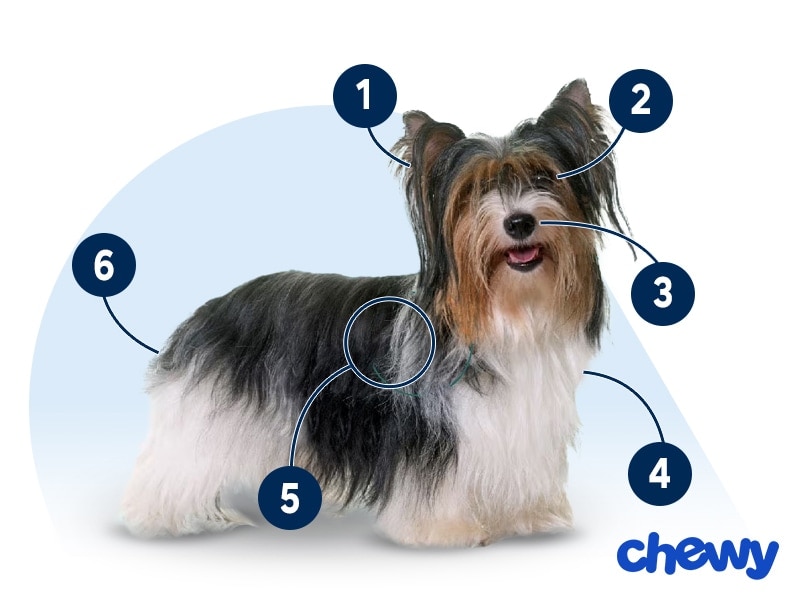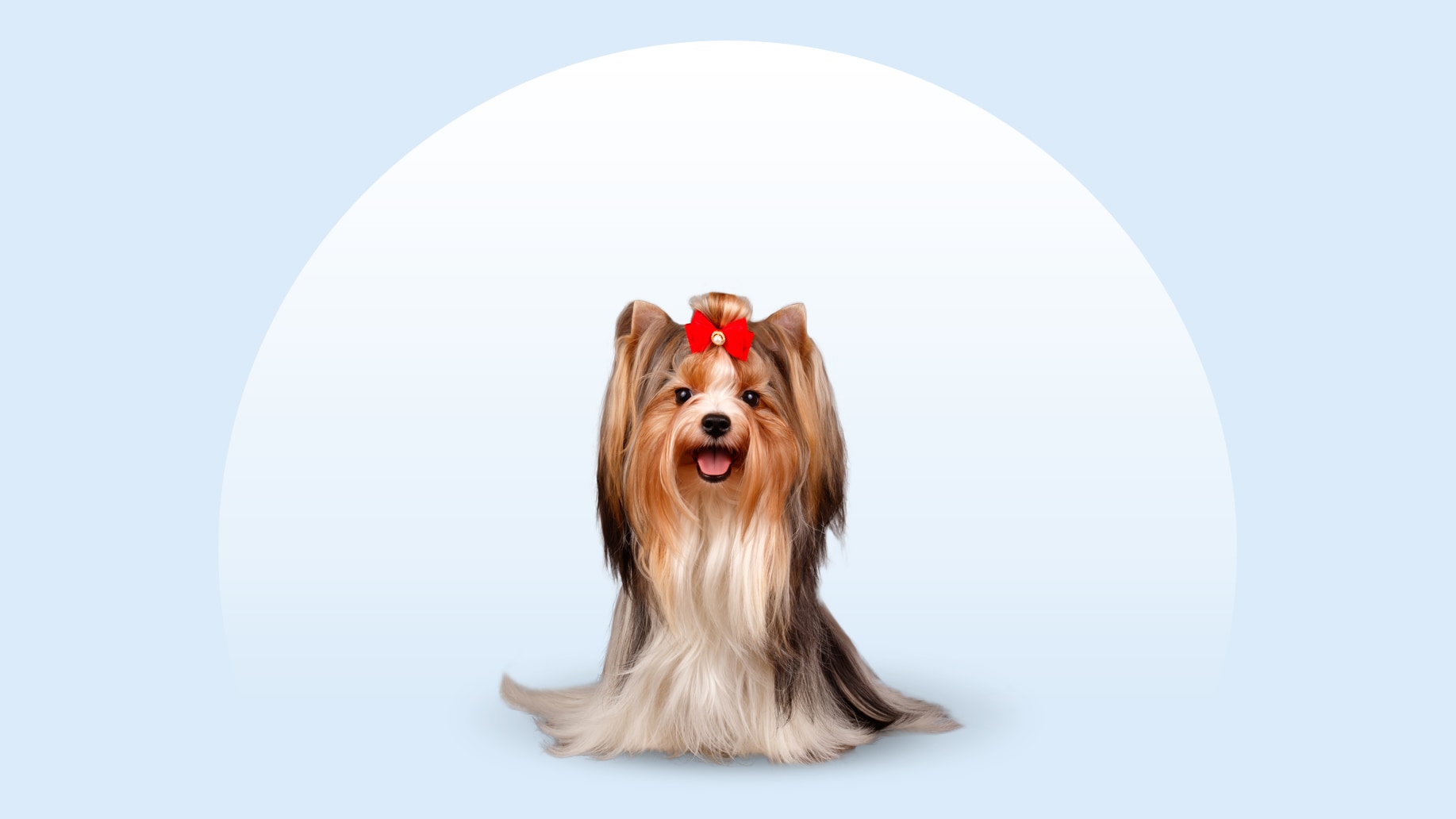Biewer Terrier
Updated January 7, 2025
Biewer Terrier
Updated January 7, 2025
Lively and charming, the Biewer Terrier is a toy breed with a long, gorgeous coat that requires consistent grooming. These feisty pups get along well with kids, adults and other animals alike. They have plenty of energy, so daily exercise and regular training are key to a well-behaved pup.
Smart, Loves to Play, Even-Tempered
Male: 4-8 pounds
Female: 4-8 pounds
Male: 7-11 inches
Female: 7-11 inches
16 years
Black Tan and White, Blue Tan and White
Biewer Terriers are small-sized dogs with large-sized personalities, lively little pups who believe you really are the center of the universe. They want to be by your side (and under your feet) every minute of the day. These charmers, instantly recognizable from their Yorkie cousins by the white in their spectacular coats, will capture your attention from the moment you meet—and they may just melt your heart in the process. Spunky, fiesty and guaranteed to light up your life, Biewers are the perfect pal to make an average day extraordinary.
Biewer Terrier Characteristics
Biewer Terrier Appearance
The Biewer Terrier’s multi-colored coat is perfectly parted down their back, falling gently as if it had just been combed. Their signature features include a plume-like tail, which is carried in an arch over their backs, and the ponytail that’s often tied with a pretty bow on their head.

- Ears
Small and neat, Biewer Terrier ears are V-shaped and stand upright.
- Eyes
Their eyes are round or almond-shaped, and they often give off a bright, intelligent expression.
- Nose
Their nose is completely black and triangular and peeks out from the dog's hair.
- Coat Length
Their spectacular coat cascades from the spine to the floor and flows neatly and elegantly.
- Coat Color
The coat is multi-hued in combinations of tan, white and either black or blue.
- Tail
The Biewer Terrier tail is set high, carried in an arch over their back and is covered by a gorgeous fluff of hair.
Biewer Terrier Temperament
The temperament of the Biewer Terrier breed is easygoing but energetic. Small-sized dogs with large-sized personalities, they are happy, smart and amicable. Fearless and devoted to their family, Biewers can be a bit of a Velcro dog, so plan on checking them into doggie daycare if you’ll be gone for long.
Biewer Terriers gets along well with adults, older kids and other animals (cats included!). Because of their small size, supervise all playtimes with toddlers and babies; small children may accidentally injure these tiny pups. Your Biewer dog will insist on being the neighborhood Welcome Wagon, so plan on making plenty of stops to meet and greet others during your daily walks. These dogs will bark at strangers if not properly trained, but that’s about the extent of their reactive ways.
How to Care for a Biewer Terrier
Biewer Terrier dogs look like high-maintenance pooches, but their overall care needs are actually relatively moderate, when compared to Poodles. You’ll spend the most time grooming your dog, but with that gorgeous coat, you’ll want to spend time running a brush through those long, silky locks. Even though these pups are small, they still need a moderate amount of exercise and training.
Grooming
Training
Diet
Exercise
Environment
Biewer Terrier Health
Biewer Terriers have a lifespan of about 16 years. They are a relatively new breed but there are several potential health issues to be aware of. Knowing what could affect your pup can help you give them the longest and happiest life possible.
- Portosystemic Shunt (Liver Shunts): Like Yorkies, some Biewers can experience a portosystemic shunt (PSS), a condition in which blood vessels are diverted from the liver. Signs include stunted growth, weight loss, vomiting and diarrhea, and behavior changes such as mental dullness, circling or head pressing. In some cases, diet change and medications may be used to treat PSS but often surgery is recommended.
- Luxating Patella: This is a condition in which the knee slips out of place resulting in possible lameness, pain, and arthritis. Depending on the severity, the kneecap can often slide back in on its own. Treatment typically includes joint supplements and, in severe cases, surgery.
- Legg-Calve-Perthes Syndrome: In this condition, the head of the femur spontaneously starts to degenerate. Signs include a gradual limp that worsens over a few weeks. It is believed this condition likely has a genetic component in toy and small breed dogs but currently there is not a genetic screening test. In most cases, surgery with physical therapy is the treatment of choice.
- Sensitive Digestive Tracts: Biewers are prone to sensitive digestive tracts resulting in frequent diarrhea and discolored stool. Work with your veterinarian to rule out underlying causes such as inflammatory bowel disease and food allergy as well as to find the right food for your pup.
- Bladder Stones: Some Biewers may be prone to bladder stones. Symptoms include increased urination, straining to urinate, or blood in the urine. Bladder stones are typically diagnosed with ultrasound or x-ray and treated in most cases with surgery followed by prescription diet to prevent them from reoccurring.
- Hypoglycemia: As a toy breed dog, Biewers are at risk for low blood sugar (hypoglycemia), both from not eating well/enough and from underlying medical issues such as a liver shunt. Symptoms often include lack of appetite and energy, disorientation/weakness, and seizures. If you suspect your pet’s blood sugar is low, take them to an emergency vet immediately.
- Progressive Retinal Atrophy (PRA): PRA is a genetic disorder resulting in vision loss. While there is no treatment, there is a genetic screening test so be sure to ask your breeder if they test their lines for PRA.
Biewer Terrier History
The Biewer Terrier origin story is a short one. This young breed began their journey in 1984.
Biewer Terrier history begins with a pair of Yorkshire Terriers bred by Werner and Gertrud Biewer, who bred Yorkies for several decades in Germany. In the early 80s, a few pups were born with the recessive piebald gene, which interrupts pigmentation so an animal’s skin or fur looks spotted or multi-colored. (This gene is not common in Yorkies.) The pups were originally called German Yorkshire Terriers, but later became known as the Biewer Yorkshire Terrier; the German singer Margot Eskens suggested adding “a la Pom Pon” because of their fluffy tail.
The Biewers made their American debut in 2003. There weren’t many breeders in either Germany or America dedicated to the breed, so the pups were hard to come by. (Can you say “exclusivity”?) To determine if pups in the US were truly Biewers, DNA tests were performed. These tests came back with typical purebred “cluster traits” (meaning genetic markers were clustered together on the test) making the Biewer the first-ever breed established using science! The American Kennel Club recognized the breed in January 2021 and is their 197th breed.
Are you looking to add a little Biewer Terrier love to your life? You can find a list of reputable breeders at the AKC’s website. Their characteristics and easygoing temperament make them much in demand and hard to find. Those traits plus their relative newness also makes the Biewer Terrier price pretty high; expect to pay between $1,500 to $4,000, although some may fetch as much as $7,000 for highly desireable lines. But for that price, you’re likely getting a dog who’s been screened for health and temperament issues and may come with pedigree papers. If you’re looking to adopt, contact the Biewer Terrier Club of America.
FAQs
Do Biewer Terriers shed?
How do you pronounce Biewer?
Are Biewer Terriers good family dogs?
Do Biewer Terriers bark a lot?
Expert input provided by Dr. Sara Ochoa, DVM and veterinary consultant for DogLab.com, and trainer Amber Walker, KPA-CTP, zoologist, and owner of Animal Intuitions.
Breed characteristic ratings provided by veterinarian Dr. Sarah J. Wooten, DVM, CVJ, a veterinarian at Sheep Draw Veterinary Hospital in Greeley, Colorado; dog trainer and behavior consultant Irith Bloom, CPDT-KSA, CBCC-KA, CDBC, owner of The Sophisticated Dog, LLC, in Los Angeles; and certified animal behavior consultant Amy Shojai, CABC, in Sherman, Texas.
The health content was medically reviewed by Chewy vets.








